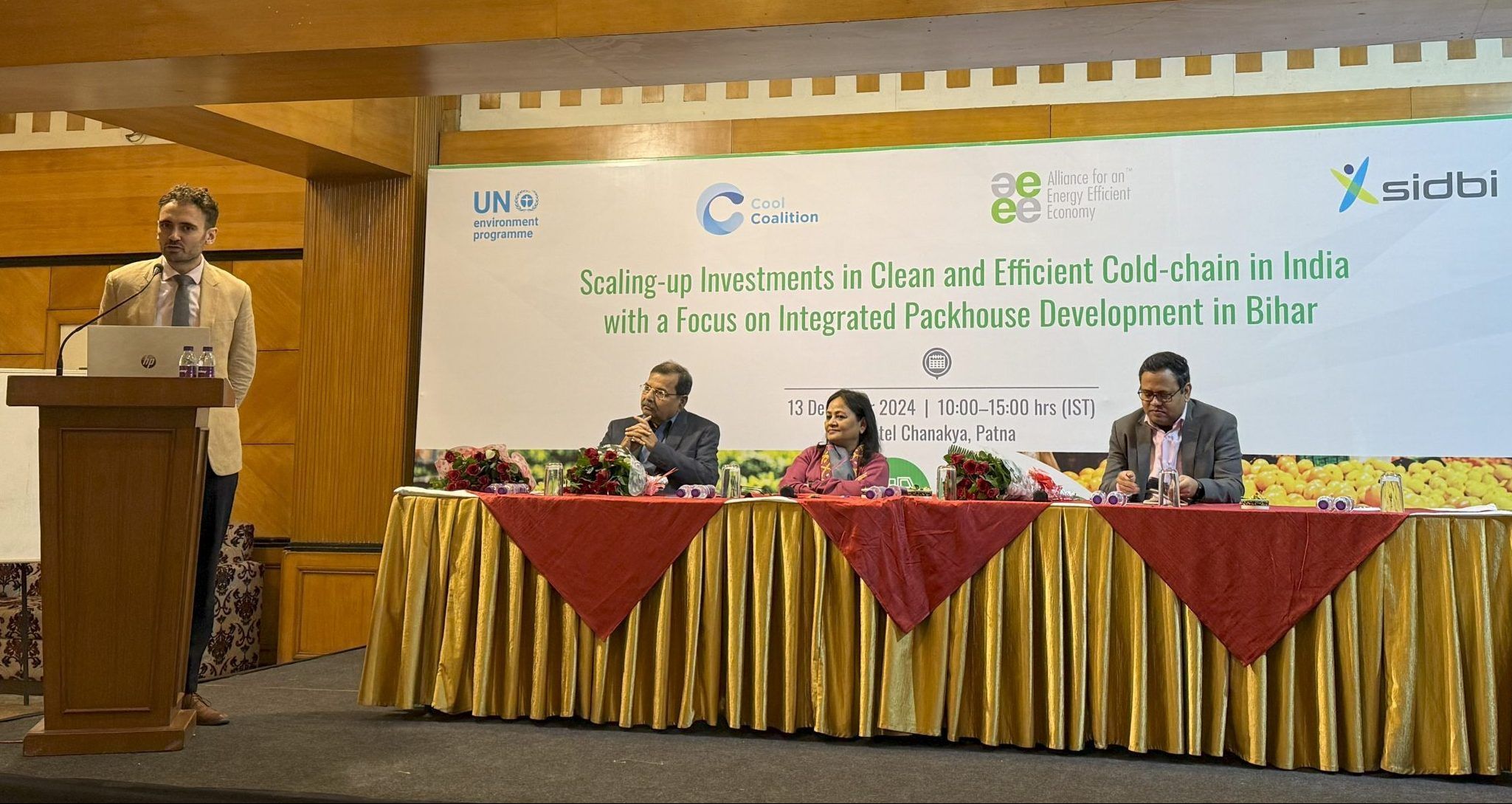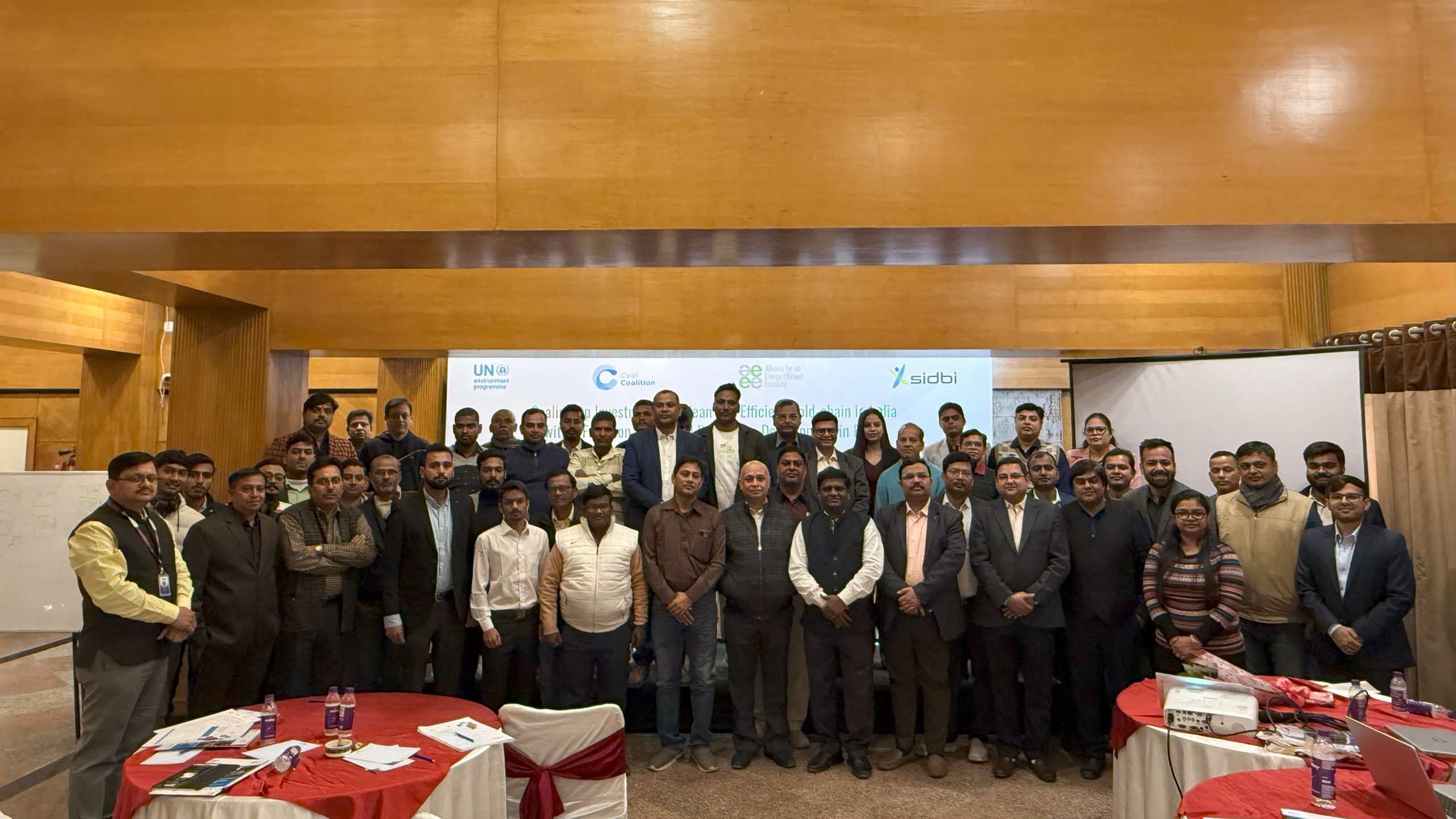Accelerating Climate-Friendly and Integrated Cold-Chain
Development for Agriculture in India
Bihar, a state of East India, struggles to leverage its high and diverse horticultural production due to underdeveloped cold-chain infrastructure, inadequate processing facilities, poor road connectivity, extreme weather, unreliable power, and limited marketing. A United Nations Environment Programme (UNEP) and Alliance for an Energy Efficient Economy (AEEE) analysis estimates that approximately 2 to 4 million tonnes of fruits and vegetables are lost post-harvest annually, generating 5 to 10 MtCO2.eq emissions in the state. With fewer than 30 packhouses available against the required 2,205 (as per National Centre for Cold-Chain Development), Bihar’s lack of integrated cold-chain infrastructure hampers rural economic growth resulting in food loss and emissions.
To accelerate the adoption of a sustainable, energy-efficient, and integrated horticulture cold chain with renewable energy integration, UNEP and AEEE, under its India Cold Chain Programme (ICCP), with support from the Small Industries Development Bank of India (SIDBI), organized a capacity-building and awareness workshop on the “Scaling-up Investments in Clean and Efficient Cold-chain in India with a focus on integrated packhouse development in Bihar” on 13 December in Patna.
The workshop supports Bihar’s Climate-Resilient and Low-Carbon Development Pathway that aims to establish a future characterized by low-carbon practices and building climate resilience of its people and systems while promoting sustainable growth.
“There is an urgent need for Bihar to capitalize on its diverse horticultural production and expand its reach to global consumers through integrated cold-chain,” said Anubha Prasad, SIDBI General Manager. “The quality of agricultural produce in Bihar is unmatched, presenting the state with significant business opportunities to export fruits and vegetables globally. We need to rapidly scale up investments in robust cold-chain infrastructure especially in first-mile packhouse with reefer transport and extend support to farmers and MSMEs to drive sustainable economic growth while reducing food loss and emissions.”
Madhavendra Kumar Thakur, Chairman at Mithila Vegetable Processing and Marketing Cooperative Union Ltd., Darbhanga, Bihar thanked UNEP and AEEE for conducting the training workshop. “Bridging the farm to fork cold-chain gap is extremely crucial for Bihar to become a global model in sustainable horticulture sector. By creating rural packhouses adopting energy-efficient, renewables and climate-friendly solutions, we can enhance nutritional security, boost rural livelihoods, and align Bihar’s growth with low-carbon development goals and with ICCP support, we will be demonstrating a sustainable packhouse in Darbhanga,” he stated.
 Representatives from UNEP and AEEE delivered training sessions that highlighted the need for integrated packhouses in Bihar, packhouse functions & processes, site selection criteria for packhouses, and steps to design a climate-friendly packhouse with energy efficient and renewable energy technologies, and good practices for cold-chain handling and post- harvest management for Litchi and Mango grown in Bihar. They also shared business models, state-specific financing mechanism, procurement guidelines and various government schemes available for cold-chain packhouse development. Additionally, SIDBI also presented on its Green Finance scheme enabling integration of sustainable technologies in cold-chain.
Representatives from UNEP and AEEE delivered training sessions that highlighted the need for integrated packhouses in Bihar, packhouse functions & processes, site selection criteria for packhouses, and steps to design a climate-friendly packhouse with energy efficient and renewable energy technologies, and good practices for cold-chain handling and post- harvest management for Litchi and Mango grown in Bihar. They also shared business models, state-specific financing mechanism, procurement guidelines and various government schemes available for cold-chain packhouse development. Additionally, SIDBI also presented on its Green Finance scheme enabling integration of sustainable technologies in cold-chain.
More than 50 participants attended the workshop demonstrating the commitment to build a resilient and sustainable cold-chain infrastructure in Bihar. The workshop enabled participants to explore innovative business models and effective procurement processes for the construction and operation of packhouses. It provided valuable insights into existing Central and State Government financial assistance for developing cold chain infrastructure in Bihar. The training workshop also focused on strengthened collaboration and coordination among departments and organizations, promoting a more integrated and strategic approach to cold-chain development and implementation in the state.
Moving forward, UNEP and AEEE will focus on opportunities for providing policy support to accelerate cold chain development in Bihar and in parallel to ongoing packhouse demonstration being developed under ICCP also prioritize developing a pipeline of packhouse projects with state governments support to address the existing cold-chain gap. This approach aims to build a more market-linked, resilient and efficient horticultural supply chain in the state.


